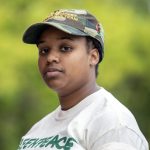“Our power is in our ability to make things unworkable. The only weapon we have is our bodies, and we need to tuck them in places so wheels don’t turn.” -Bayard Rustin
Right now, I sit suspended from the Fred Hartman Bridge in Houston, Texas. This is my attempt to stop the wheels from turning in this extractive economy, even if only for a day. The Fred Hartman Bridge spans the Houston Ship Channel, the largest fossil fuel thoroughfare in the United States, and second-largest in the world. Each day, over 700,000 barrels of oil pass through the Ship Channel, and should the fossil fuel industry have its way, this number will increase to at least 2 million.
The landscape of the area surrounding this area is striking. And not in a good way. There are refineries for miles, with smokestacks consistently emitting plumes of smog into the air, interrupted occasionally only by gas flames that dot the sky like deadly Olympic torches and large storage vats full of any number of hazardous chemicals involved in the production and containment of fossil fuels and plastics products. This is the heart of the fossil fuel industry in the United States.

ExxonMobil storage tanks sit in floodwaters nearly a week after Hurricane Harvey hit the Texas Gulf Coast and the Houston area. Notice the bridge in the background of the photo, that’s where I am.
The impacts of what would otherwise resemble a dystopian landscape and economy are all too real for both residents of Houston and the rest of us who call Earth our home. Globally, we’ve witnessed as storms have gained more strength, fires become more common, and extreme weather upset ecosystems and uproot lives. We’ve braced for more frequent and forceful hurricanes, or watched as they have devastated entire homelands, communities, and even islands, as they have in the Bahamas, Puerto Rico, the Virgin Islands, New Orleans, and here in Houston. Once the damage is done, we’ve frantically searched for ways to lend aid and help communities rebuild, or we’ve sat by and felt helpless and hopeless, victims of a system that seems to be spiraling out of control, even while millionaires, politicians, and corporations tell us that all is well.

A person in an inflatable boat paddles down flooded Highway 610 in the Houston area as rains from Hurricane Harvey continue to fall in the area.
But we are not fooled. I am not fooled. Not when I know that the communities that are hit the hardest by the impacts of the fossil fuel industry and the broader climate crisis are communities like the very ones I’ve lived in all of my life. Black and Brown communities of families and individuals who have been made to deal with the health consequences of extractive industries in their own homes, where most of us seek refuge from a society that frequently alienates and seeks to dehumanize us. Indigenous communities that have resisted an extended war of extermination for centuries and continue to feel the impacts of the decimation of their homelands in a multitude of ways. Poor and rural communities that are often left out of national discussions around quality of life, especially during election seasons where everyone is vying for the votes of a dwindling to the nonexistent middle class while trying not to alienate the wealthy ruling class.
These communities become the dumping grounds for extractive industries, because they know, as many of us do, that these are the places least prioritized, serviced, and heard in our societies. In the southeast Houston neighborhoods of Clinton Park (90% African American) and Harrisburg/Manchester (88% Latinx) residents are exposed to a disproportionately high number of pollutants, which puts them at risk for a number of health complications, and simultaneously have some of the highest rates of being uninsured in Harris County. Elsewhere, these kinds of neighborhoods look like many of those along “Cancer Alley,” where most families and households have a member who has cancer, has had cancer, and/or has died of cancer. For these communities, there is no doubt that this is a crisis.

A woman stands at the window of her home looking out at Shell refinery just a couple of yards away, in an area of Louisiana deemed “Cancer Alley.”
And yet, as much as executives, members of the ruling class, and apathetic U.S. residents have tried to confine the impacts of this extractive economy to neighborhoods and communities that are out of sight and out of mind for many, the climate crisis cannot be confined and will soon bring its reach to everyone’s doorstep. Our environment is changing, and although Earth is resilient, many species, including our own, are less resilient than we imagine.
Transition is inevitable. Justice is not.
It is up to us to ensure a Just Transition and build the world that we want to live in and that future generations deserve, so that they all may thrive. Abolitionist Mariame Kaba often reminds us, “The things you are and are NOT doing in this exact historical moment are what you would or would not have done in the 18th, 19th, early 20th centuries.”
Who will you be and what will you do? Today, disrupting the function of an extractive and unsustainable fossil fuel energy is what I’ve chosen to do.
I invite you to also choose to take action. It doesn’t have to involve suspending yourself from a bridge, and it may not involve direct action at all, but we all must choose and we need a diversity of tactics, ideas, and people in order to create a better world.
Don’t be fooled by the rhetoric of Big Oil or any of the politicians taking money from them. In the battle between Justice for All People and an Extractive Destructive Economy and Society, there is no middle ground and no neutral action. So, which side are you on?









